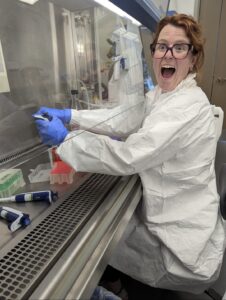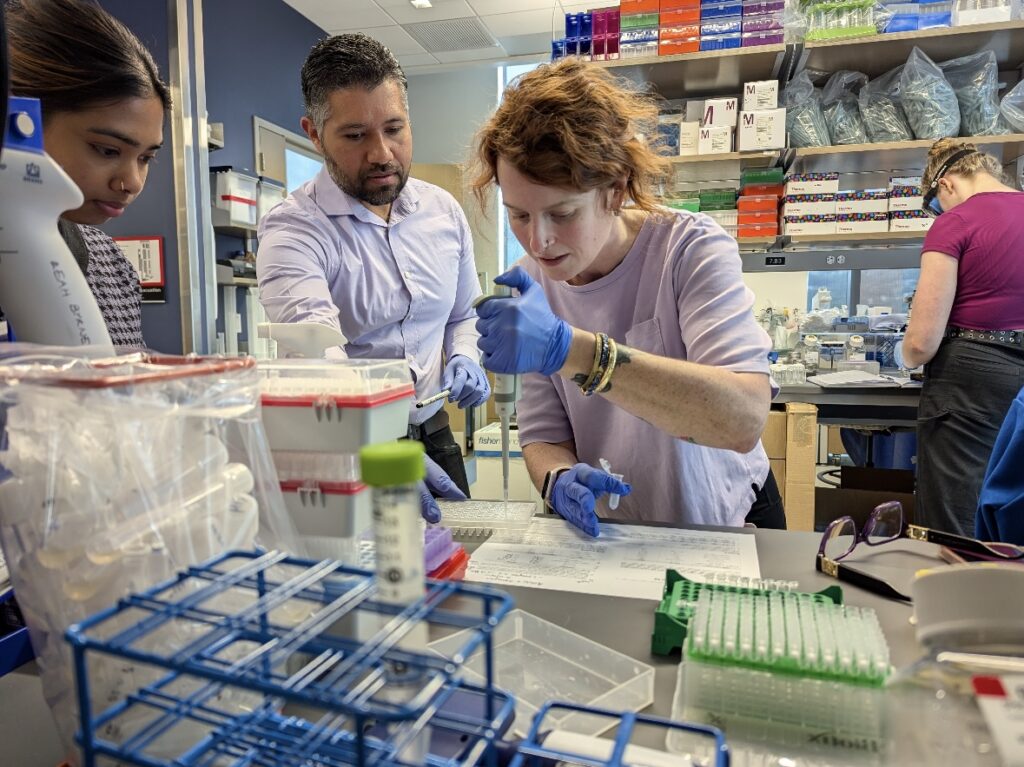Elizabeth Wood applied to the Pittsburgh Gene Therapy Bootcamp on a whim. The husbandry technician, or “monkey nanny” at the University of Pittsburgh learned about it from a mass email. Then she forgot all about it until she was accepted. “Honestly, I was shocked,” she recalled. “The first thing that went through my head was this must be a mistake.”
This thought process is understandable, given that the Bootcamp advertised the opportunity for graduate students and postdoctoral fellows, though no prior experience is required. Wood left college before finishing her degree over 20 years ago.
The Pittsburgh Gene Therapy Bootcamp was launched in 2023 by the Byrne Lab with the goal of hosting it annually. All guest speaker presentations are open to the community. The program includes one intensive week of hands-on wet lab experiments in AAV viral vector packaging and purification, followed by eight weeks of weekly wet labs and guest lectures.
As part of the wet lab training, students run single-cell RNA-Seq experiments and produce and analyze data on the topic of in vivo viral vector-mediated gene delivery. Data collected during the course will be reported in a manuscript that will be submitted to a preprint server, and course participants will receive co-authorship on the paper. Students have opportunities to shadow and network with professionals working in the field of gene therapy, including genetic counselors, local biotech companies, physicians, and academics.
Wood began the Bootcamp feeling extremely intimidated. “I felt like the biggest smelly kid in the classroom, and everyone was pointing and laughing at me,” she said. “Of course, I was completely wrong. From the instructors to the other students in the class, they were extremely kind and helpful and answered any questions I had along the way. It was a wonderful feeling to have all these strangers turned to friends help me succeed.”
Indeed, the experience was life changing.
Wood took a circuitous path to get here. After leaving college, she was a bartender for 20 years. She left the restaurant and hospitality industry due to COVID. A job with PetSmart had her thinking about returning to college to get a degree in behavior or nutrition. In January 2023, she resumed her collegiate education at Butler County Community College and fell in love with school. As she progressed in her current job, she began moving away from nutrition and animal behavior, gravitating toward psychology.
This past summer, she took her first anatomy class. Prior to the class, she was grossed out by the idea, but by the end, she was fascinated with the human body and how it works. And now because of her Bootcamp experience, she is planning on pursuing a career in either genetics or genomics. “What exactly I want to do in the field of science is still a mystery,” she said. “There is so much out there; I want to experience all of it.”
As part of Bootcamp, Wood worked on a hypothetical project. When first contemplating what disease she wanted to treat, she knew she wanted it to be something a lot of people deal with so she could make their lives better or at least more manageable. After investigating different mental illnesses, she settled on bipolar disorder. “I know from watching friends and family suffer from it but also the struggle I have combating it, I have seen what damage this monster of destruction can do to someone,” she shared.
Wood researched the AKAP 11, which stands for A-Kinase Anchor Protein 11. This gene was identified as a risk gene during a recent collaboration between Bipolar Exome (BipEX) and Schizophrenia Exome Sequencing Meta-analysis (SCHEMA) when they did a whole exome in bipolar disorder. They also discovered the AKAP 11 is a risk gene in schizophrenia.

Wood’s idea is to treat bipolar disorder through gene therapy, by combining optogenetics and nanoparticles. The material used in creating the desired nanoparticle is a magneto luminescent with CRISPR/Cas9 and gRNA. The delivery plan would be an IVC or an intracerebroventricular injection, to bypass the blood brain barrier. The process will be achieved by stimulating the neurons with an energy source that is directed at certain regions in the brain where the magneto luminescent nanoparticles are located.
“My end goal is to modify the symptoms and make them more manageable to deal with,” Wood explained. She learned during her research that bipolar came from millions of years of evolutionary change to the human brain that affects one’s creativity level.
This is not the only thing Wood learned. Bootcamp opened her eyes and showed her that there is so much more out there. She realized that genetics are the puzzle pieces that make us who we are and why.
“I learned so much about myself and what I am capable of [and] met some great people and made friends along the way,” Wood said about her experience. “I did not want the Bootcamp to end. On my way home after our last day, I cried because it was over. I would do it all over again in a heartbeat.”
